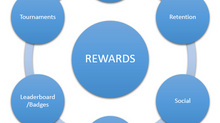Team Dynamic Concepts
- Vishwajeet Kale
- Nov 23, 2015
- 2 min read
In this month’s class of research in team dynamics, I have a lot of learning to take back with me. To begin with, this month’s class taught us a lot about factors such as motivation, cooperation, competition, communication, decision making, teamwork, team building and team training, etc. When all these factors are combined together they form team dynamics. My goal towards mastery is interact and work with like-minded individuals who love making games because they are passionate about video games. The biggest take away for me is communication, I believe in gaming industry communication and making connections is one of the most important aspects of team dynamics. Clear communication in a team avoids conflicts and misunderstandings. Once I have found individuals who share the same ideas and perspective towards making games as me, I look forward to getting the brainstorming process. I do realize there are a lot of ideas that will bounce off each team member, this may also lead to conflicts. But, I will demonstrate leadership qualities of taking the initiative of clearing the air and motivating each team member towards the common team goals versus personal goals. In a team of creative individuals, cooperation is very essential. Member are more likely to act cooperatively if they believe others are likely to act in the same way (Dawes, 1988). When all team members cooperate and work towards a common goal, which in this case is to work on a mobile game concept, transform it into a minimum viable product and further work upon it. As a part of the process of making games, we will come across several issues and hurdles which we will have to come over as a whole team. Team problem solving is more effective versus individual problem solving. As a team, a multiple perspectives for a solution are produced towards the problem, which helps the team be more productive and efficient at problem solving. The reward in this project would be having a successful title out in the market which also goes onto each member’s portfolio. If the game is a hit and is doing well on the market place, it will only help us realize that we as a team work effectively and must continue to work on more titles for the love for video games.
References
Dawes, R. (1988). Rational choice in an uncertain world. San Diego, CA: Harcourt Brace Jovanovich












Comments